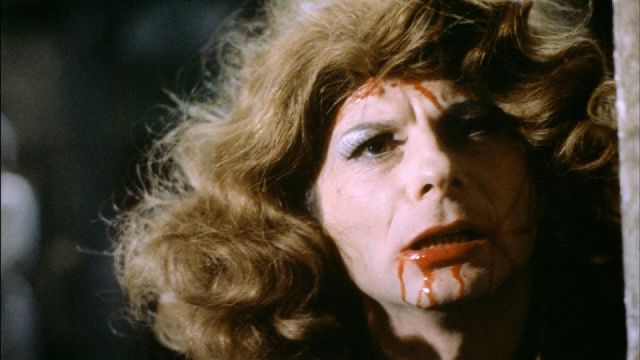The Tenant (1976) 
“How could he escape from his nightmares?”

Director: Roman Polanski
Cast: Roman Polanski, Isabelle Adjani, Melvyn Douglas
Synopsis: A bureaucrat rents a Paris apartment where he finds himself drawn into a rabbit hole of dangerous paranoia.
His conviction for statutory rape notwithstanding, there is something disturbing about Roman Polanski. You feel, merely by looking at him, that there is a deep intelligence beneath the sharp, almost feral, features, but that that intelligence is tainted by something… intangible; something that has a touch of unpleasantness about it. Of course, he’s led a tragic life: survivor, with his father, of the Nazi holocaust, husband of the beautiful starlet, Sharon Tate, who was famously murdered by Charles Manson and his satanic ‘family’. Little wonder, then, that there’s a little darkness in his soul… It’s a darkness that is evident in many of his films, not least The Tenant, which shares many of the themes explored in Cul-de-Sac (1966) and Rosemary’s Baby (1968) — the chief one of which is the sense of alienation felt by people living in urban apartments wedded, this time, to the additional burden of being something of an awkward social outcast. The unassuming lead character, while perfectly decent, is the kind that some people would make little effort to befriend.
Polanski himself takes the lead role, and, while he is not a brilliant actor, he is at least perfectly cast looks-wise in the part of a timid bachelor who rents a run-down apartment in Paris at a time when available apartments are at a premium. The building in which the apartment is situated is peopled by a cold, unfriendly bunch. Shelley Winters plays the concierge, a woman with little time for the others occupants; veteran Hollywood actor Melyyn Douglas is Monsieur Zy, the recalcitrant owner of the building who demands that his tenants live as quietly as possible; other tenants include the shrewish M. Dioz (Jo Van Fleet (East of Eden, The King and Four Queens) who wages spiteful wars on those with whom she has fallen into disagreement, and the meek mother (Lila Kedrova — The Kremlin Letter) and her disabled daughter who become the focus of Dioz’s vitriol.
The apartment Trelkovsky (Polanski) rents was previously owned by a young woman who attempted suicide — the damage she caused to the glass roof beneath the apartment window from which she jumped is still unrepaired when he moves in — and, after visiting the woman in hospital shortly before she dies, he slowly becomes obsessed with both her and the fate that befell her. Trelkovsky’s obsession grows as things get strange at home: neighbours complain unjustly about the noise he makes at night; he sees people in the bathroom across the courtyard staring at his window for hours on end, and he discovers that the walls of the bathroom are scrawled with Egyptian hieroglyphics. As his mental health begins to deteriorate, Trekolvsky comes to suspect that his neighbours are trying to both drive him to suicide and turn him into the previous tenant.
Polanski spends a lot of time identifying the various forces that gradually converge on the hapless Trelkovsky, and maintains a gloomy, almost Kafkaesque mood that is matched by the film’s leisurely pace. Only the beautiful Isabelle Adjani, as a friend of the previous tenant, with whom Trelkovsky forms a tentative friendship, adds some colour and life to the picture. She’s a deliberately incongruous character, at odds, in terms of personality, with all the others (who are mostly belligerent and unfriendly), and the failure of Trelkovsky to trust and embrace her suggests the inevitability of his fate, while also indicating that he is never free to make his own decisions and that his future is determined by forces beyond his control. As his eventual mental disintegration gathers pace — and after a slow build up, it seems to snowball with indecent haste in the movie’s final act — the viewer is deliberately left uncertain as to what is really going on. Is Trelkovsky’s persecution all the imagination of his paranoid disorder? Is it the apartment itself that is at work on his sanity? Or are his neighbours truly part of a murderous clique? Only one of these theories can be discarded with any certainty by the time the end credits roll, leaving us with the kind of intrigue which, while neatly — if somewhat unimaginatively — bringing the film full circle, succeeds in leaving the viewer dwelling on its meaning long after the film has finished.
Despite its often funereal pace, The Tenant is never anything less than a completely absorbing experience that cleverly draws the viewer into Trelkovsky’s nightmare world, before subtly repelling us as his disintegration takes hold. The final act, sadly, is not of the quality of the previous two (perhaps because it is only in the third act that conventional horror techniques come to the fore) and may leave the viewer with a vague sense of dissatisfaction — but overall this is a movie that should not be overlooked.
(Reviewed 31st March 2010)
httpv://www.youtube.com/watch?v=ZmhIMbdecEU
